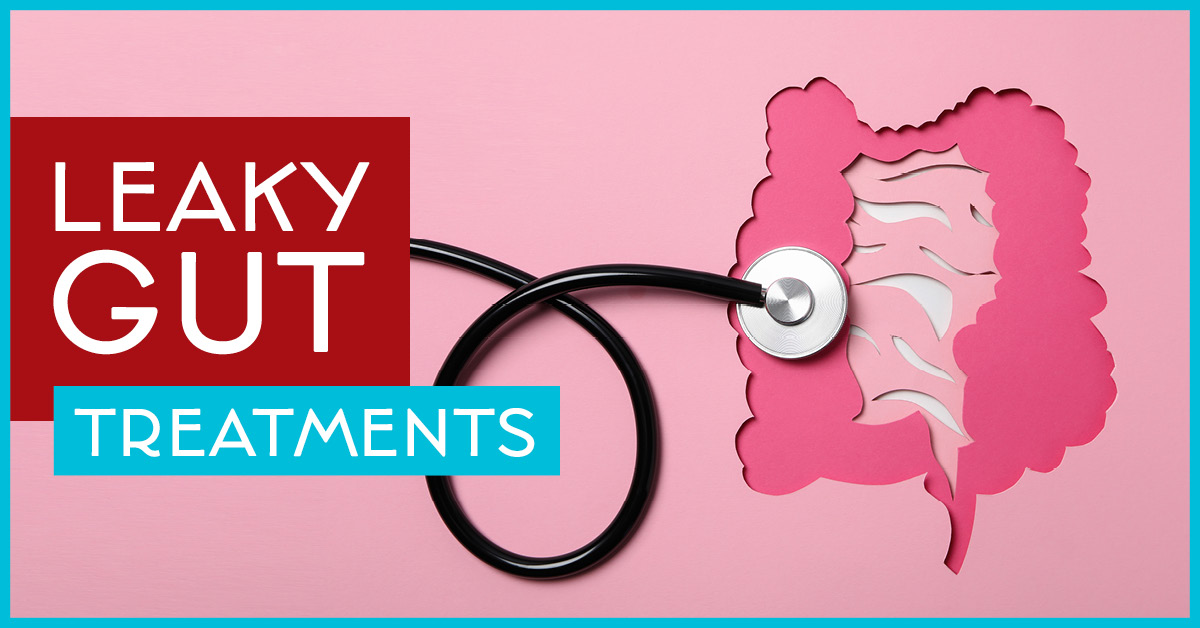
When you have a leaky faucet, you call a handyman. But what do you do when you have a leaky gut?
Leaky gut: A definition
Before we dive in, let’s explain what leaky gut is. Leaky gut syndrome is a condition that occurs when the gut lining becomes permeable, allowing toxins, bacteria and other harmful substances to leak into the bloodstream.
I compare leaky gut syndrome to having paper cuts all over your skin, which breaks down the protective barrier and leads to inflammation. Chronic inflammation can cause insulin resistance/diabetes, heart disease, autoimmune disorders and other diseases.
Causes of leaky gut
Leaky gut, along with other common gut health conditions, can arise from a number of factors including diet, stress, medications and environmental exposures. (You can read more on this in my “Functional Medicine Approach to Gut Health” post.)
Treating leaking gut
So what can you do to heal leaky gut? While each person is unique, here are 10 ways I commonly work with my patients to improve their gut health.
- Eliminate inflammatory foods.[1] By removing foods that cause inflammation in the gut, you can help to reduce inflammation and promote gut healing. Common inflammatory foods include gluten, dairy, soy and processed foods. I utilize food intolerance testing to pinpoint foods that could be causing issues for my patients.
- Consume gut-healing foods.[2] Eating foods that are rich in nutrients and promote gut health can help to repair the gut lining. Examples of gut-heathy foods include bone broth, fermented vegetables and healthy fats.
- Take probiotics. [3] Probiotics can help to restore the balance of beneficial bacteria in the gut, which may be disrupted in individuals with leaky gut. (Check out my “Functional Medicine Approach to Gut Health” to learn more about probiotics vs. prebiotics.)
- Use digestive enzymes. [4] Digestive enzymes can help to break down food and reduce stress on the gut, which may promote healing.
- Manage stress. [5] Chronic stress can contribute to the development of leaky gut, so managing stress through techniques such as meditation, yoga and deep breathing may be helpful. This falls under what I call “spiritual wellness,” which is one of my 5 Pillars of Health and Wellness.
- Get enough sleep. [6] Sleep is important for gut health (and overall health!), as it allows the body to repair and regenerate. Getting enough quality sleep may help to promote healing of the gut lining. Get some sleep tips here.
- Reduce exposure to toxins. [7] Toxins in the environment, such as chemicals and pollutants, can contribute to leaky gut. Reducing exposure to these toxins and regularly completing detox protocols may help to promote gut healing. Read about detoxing for clean living.
- Take supplements. [8]Supplements such as glutamine, zinc and vitamin D may be helpful in promoting gut healing. However, it’s important to work with your doctor to determine which supplements are right for your individual needs.
- Address underlying infections. [9] Infections such as SIBO (small intestinal bacterial overgrowth) or Candida overgrowth can contribute to leaky gut. Addressing these underlying infections may help to promote gut healing.
- Implement an elimination diet. [10] An elimination diet involves temporarily removing potentially problematic foods from the diet, then slowly reintroducing them to determine if they are contributing to leaky gut. In addition to food intolerance testing, elimination diets can help to identify foods that may need to be avoided long-term to promote gut healing.
Ready to fix your leaky gut?
Please reach out if you’d like functional medicine support to determine the underlying cause of any gut-related symptoms and develop an appropriate treatment plan. I’m seeing patients at Evoke5, my functional family medicine clinic in Oklahoma City, as well as offering online consultations for clients across the country.
1. Fasano A. Leaky gut and autoimmune diseases. Clin Rev Allergy Immunol. 2012;42(1):71-78. doi:10.1007/s12016-011-8291-x
2. Selhub EM, Logan AC, Bested AC. Fermented foods, microbiota, and mental health: ancient practice meets nutritional psychiatry. J Physiol Anthropol. 2014;33(1):2. doi:10.1186/1880-6805-33-2
3. Fasano A. Leaky gut and autoimmune diseases. Clin Rev Allergy Immunol. 2012;42(1):71-78. doi:10.1007/s12016-011-8291-x
4. Roxas M. The role of enzyme supplementation in digestive disorders. Altern Med Rev. 2008;13(4):307-314
5. Konturek PC, Brzozowski T, Konturek SJ. Stress and the gut: pathophysiology, clinical consequences, diagnostic approach and treatment options. J Physiol Pharmacol. 2011;62(6):591-599
6. Irwin MR. Why sleep is important for health: a psychoneuroimmunology perspective. Annu Rev Psychol. 2015;66:143-172. doi:10.1146/annurev-psych-010213-115205
7. Genuis SJ. Toxic causes of mental illness are overlooked. Neurotoxicology. 2008;29(6):1147-1159. doi:10.1016/j.neuro.2008.08.003
8. Lambert GP. Stress-induced gastrointestinal barrier dysfunction and its inflammatory effects. J Anim Sci. 2009;87(14 Suppl):E101-E108.
doi:10.2527/jas.2008-520
9. Fasano A. Leaky gut and autoimmune diseases. Clin Rev Allergy Immunol. 2012;42(1):71-78. doi:10.1007/s12016-011-8291-x
10. Drisko JA, Bischoff BJ, Hall M, et al. Treating irritable bowel syndrome with a food elimination diet followed by food challenge and probiotics. J Am Coll Nutr. 2006;25(6):514-522
